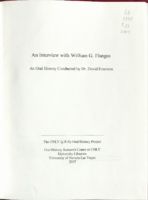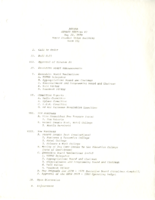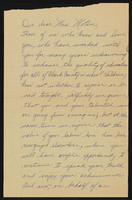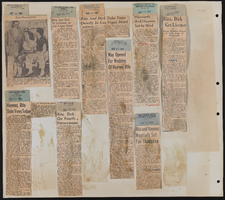Search the Special Collections and Archives Portal
Search Results

Interview with Philip Wymer Allen, August 26, 2004
Date
Archival Collection
Description
Text
MGM Mirage Records on Mandalay Resort Group
Identifier
Abstract
The MGM Mirage Records on Mandalay Resort Group consists of materials from Mandalay Resort Group’s office of public relations and community affairs records, which was closed after Mandalay’s corporate merger with MGM Mirage in 2005. The files, dating from 1968 to 2005, provide documentation of Mandalay Resort Group’s external affairs and internal operations. They contain subject files, photographs, negatives, slides, correspondence, VHS tapes, corporate publications, press releases, press kits, wholesale room agreements, hotel ephemera, employee newsletters, and press clippings. Of particular interest are files and photographs documenting the planning, development, construction, and opening of the Mandalay Resort Group properties.
Archival Collection

Isaac Barrón oral history interview: transcript
Date
Archival Collection
Description
Oral history interview with Isaac Barrón conducted by Maribel Estrada Calderón and Claytee D. White on March 27, 2019 for the Latinx Voices of Southern Nevada Oral History Project. Isaac Barrón was born and raised in Las Vegas, Nevada. His father entered the United States as a Bracero. Barrón attended Rancho High School and earned his bachelor's degree in secondary education from UNLV. He currently teaches history at Rancho High School and serves as North Las Vegas' Councilman. In this oral history, Barrón recalls his youth in North Las Vegas, navigating the presence of gangs, and his path to being a community activist and advocate for North Las Vegas youth. He has led volunteer efforts for community improvement projects, including the plans for a new public library. He holds the distinction of being the first Latinx member of the North Las Vegas City Council and Southern Nevada's first Hispanic Mayor Pro Tempore. In 2013, he was elected to represent Ward 1 and was reelected for a second term in April 2017. He discusses being Mexican American, the Coalition of Pan American Organizations, the Hispanic Student Union, the Bracero Program, and Rancho High School.
Text

Transcript of interview with William G. Flangas by Dr. David Emerson, September 27, 2006
Date
Archival Collection
Description
Text

Meeting minutes for Consolidated Student Senate, University of Nevada, Las Vegas, May 22, 1979
Date
Archival Collection
Description
Text

Mabel Hoggard: educational correspondence
Date
Archival Collection
Description
Folder of materials from the Mabel Hoggard Papers (MS-00565) -- Educational work and legacy file. This folder contains correspondence to and from Mabel Hoggard related to her teaching career. Correspondents include the University of Nevada, Las Vegas; Oran K. Gragson; Attorney Harry H. Jones, OCD supervisor; Mabel Hoggard Elementary School; Clark County School District; Department of Education, and others.
Text

Interview with Robert Elmer Friedrichs, February 25, 2004
Date
Archival Collection
Description
Text

Interview with Benjamin Clinton Diven, April 12, 2005
Date
Archival Collection
Description
Text

